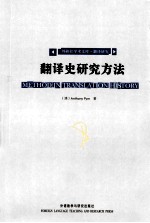

翻译史研究方法PDF电子书下载
- 电子书积分:10 积分如何计算积分?
- 作 者:(澳)ANTHONY PYM著
- 出 版 社:北京:外语教学与研究出版社
- 出版年份:2012
- ISBN:7560085296
- 页数:220 页
1.History 1
History within translation studies 1
The parts of translation history 4
The interdependence and separateness of the parts 6
A too-brief history of translation history 9
Reasons for doing translation history 15
2.Importance 20
What is importance? 20
Against blithe empiricism 24
Personal interests 30
Research and client interests 31
Subjective interests and humility 36
3.Lists 38
Reasons for lists 39
Getting data 41
The difference between catalogues and corpora 42
Shortcomings in bibliographies:four examples 42
Completeness in history and geology 48
Sources as sifted sands 50
The historian as reader of indexes 53
4.Working definitions 55
Why some information has to be thrown out? 55
In defence of definitions 57
Inclusive definitions 58
Defining translations from paratexts 61
Corpora of borderline cases 65
How Wagner sneaked in? 67
How Salomé danced out? 68
5.Frequencies 71
Statistics and importance 71
Diachronic distribution 74
Retranslations,re-editions and nontranslations 79
Retranslation and its reasons 82
A general diachronic hypothesis 84
6.Networks 86
Reconstructing networks from within 86
Mapping networks 91
Two cheap transfer maps 93
Lines and symbols 97
The spatial axis 102
Cities as borders 105
7.Norms and systems 106
Actually reading translations 106
Norms? 110
Systems? 115
Leaps of faith 118
The will to system 119
Subjectless prose 122
Where's the gold? 123
8.Regimes 125
What are regimes? 125
Starting from debates 128
A regime for twelfth-century Toledo 130
A regime for Castilian protohumanism 132
A regime for early twentieth-century poetry anthologies 136
Translation as a transaction cost 140
9.Causes 143
Systemic and probabilistic causation 144
Aristotle 148
Transfer as material causation 150
Final causes in theories of systems and actions 151
Equivalence as formal cause 155
Translators as efficient causes 157
Multiple causation 158
10.Translators 160
Translators,not'the translator' 160
Translators can do more than translate 161
Translators have personal interests 166
Translators can move 172
Translators can go by several names 174
11.Intercultures 177
Where intercultures are hidden? 178
Translations or translators? 182
Strangers and trust 183
Interculturality and its negation 186
Intercultural professions as a social context 187
An alternative basic link 189
What is a culture? 190
12.Interdisciplinarity 193
Personal reasons for pessimism 193
A lacking discipline 195
Cultural Studies? 198
Intercultural Studies 199
References 203
Index of Names & Topics 215
- 《中风偏瘫 脑萎缩 痴呆 最新治疗原则与方法》孙作东著 2004
- 《红色旅游的社会效应研究》吴春焕著 2019
- 《汉语词汇知识与习得研究》邢红兵主编 2019
- 《生物质甘油共气化制氢基础研究》赵丽霞 2019
- 《东北民歌文化研究及艺术探析》(中国)杨清波 2019
- 《联吡啶基钌光敏染料的结构与性能的理论研究》李明霞 2019
- 《异质性条件下技术创新最优市场结构研究 以中国高技术产业为例》千慧雄 2019
- 《英汉翻译理论的多维阐释及应用剖析》常瑞娟著 2019
- 《《国语》和《战国策》词汇比较研究》陈长书著 2017
- 《中国制造业绿色供应链发展研究报告》中国电子信息产业发展研究院 2019
- 《中风偏瘫 脑萎缩 痴呆 最新治疗原则与方法》孙作东著 2004
- 《水面舰艇编队作战运筹分析》谭安胜著 2009
- 《王蒙文集 新版 35 评点《红楼梦》 上》王蒙著 2020
- 《TED说话的力量 世界优秀演讲者的口才秘诀》(坦桑)阿卡什·P.卡里亚著 2019
- 《燕堂夜话》蒋忠和著 2019
- 《经久》静水边著 2019
- 《魔法销售台词》(美)埃尔默·惠勒著 2019
- 《微表情密码》(波)卡西亚·韦佐夫斯基,(波)帕特里克·韦佐夫斯基著 2019
- 《看书琐记与作文秘诀》鲁迅著 2019
- 《酒国》莫言著 2019
